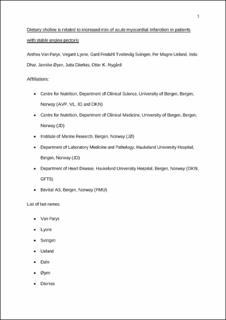Dietary choline is related to increased risk of acute myocardial infarction in patients with stable angina pectoris
Van Parys, Anthea; Lysne, Vegard; Svingen, Gard Frodahl Tveitevåg; Ueland, Per Magne; Dhar, Indu; Øyen, Jannike; Dierkes, Jutta; Nygård, Ottar
Peer reviewed, Journal article
Accepted version
Permanent lenke
https://hdl.handle.net/11250/2647464Utgivelsesdato
2019Metadata
Vis full innførselSamlinger
- Articles [3012]
- Publikasjoner fra CRIStin [3066]
Originalversjon
10.1016/j.biochi.2019.11.001Sammendrag
High plasma choline has been associated with the metabolic syndrome and risk of chronic diseases, including cardiovascular disease. However, dietary choline is not correlated with choline plasma concentrations, and there are few studies and contradictory evidence regarding dietary choline and cardiovascular events. In addition, a recommended dietary allowance for choline has not been established and remains a point of contention.
This study assessed the association between dietary choline, including choline forms, and risk of incident acute myocardial infarction (AMI) in patients with suspected stable angina pectoris (SAP).
In total 1981 patients (80% men, median age 62) from the Western Norway B Vitamin Intervention Trial were included in this analysis. Information on dietary choline was obtained using a 169-item food frequency questionnaire. The Cardiovascular Disease in Norway project provided data on AMI. Risk associations were estimated using Cox-regression analysis using energy-adjusted choline intake.
Median (25th, 75th percentile) total energy-adjusted choline intake was 288 (255, 326) mg/d. During a median (25th, 75th percentile) follow-up of 7.5 (6.3, 8.8) years, 312 (15.7%) patients experienced at least one AMI. Increased intakes of energy-adjusted choline (HR [95% CI] per 50 mg increase 1.11 [1.03, 1.20]), phosphatidylcholine (HR per 50 mg increase 1.24 [1.08, 1.42]) and sphingomyelin (HR per 5 mg increase 1.16 [1.02, 1.31]) were associated with higher AMI risk.
In conclusion, higher dietary intakes of total choline, phosphatidylcholine and sphingomyelin were associated with increased risk of AMI in patients with SAP. Future studies are necessary to explore underlying mechanisms for this observation.
